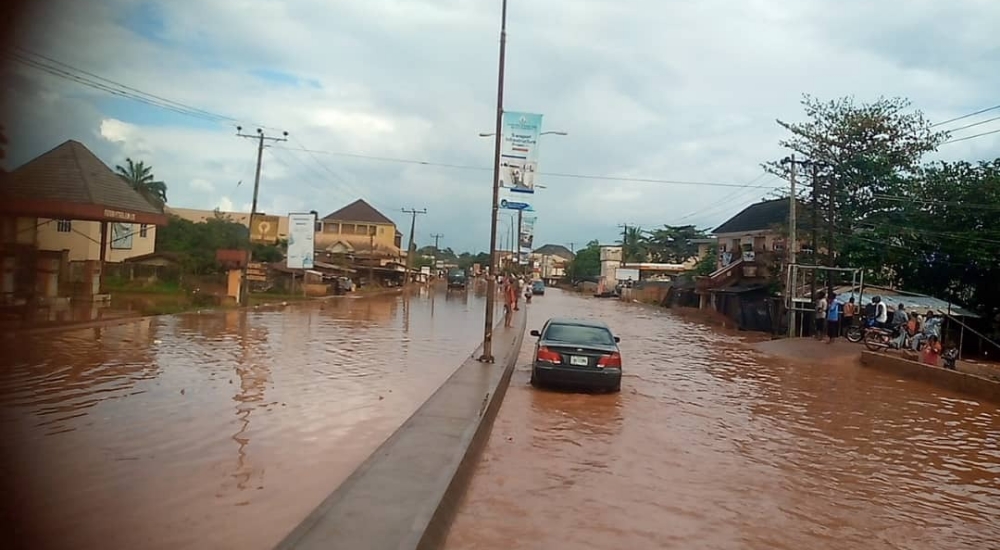The Banking Committee in Nigeria on Thursday assisted victims of the recent floods in some parts of Jigawa State with a solidarity visit to the state capital, Dutse, while donating various relief items to the state government.
The donation is part of their own contribution to alleviating the plight of people affected by the natural disaster in September 2024.
The donation of relief items comprising food items including bags of rice, cartons of vegetable cooking oil, mattresses and beverages was presented to Jigawa State Governor, Malam Umar A. Namadi by a high-level delegation of the Committee Banks in Nigeria led by its Chairman and Group Managing Director/Chief Executive Officer, United Bank for Africa Plc (UBA), Dr. Oliver Alawuba.
Other CEOs of the banks who were part of the delegation included the Managing Director/Chief Executive Officer (GMD/CEO), Access Bank Plc, Mr. Roosevelt Ogbonna; Group Managing Director/Chief Executive Officer (GMD/CEO), Zenith Bank Plc, Dame (Dr.) Adaora Umeoji; and Group Managing Director/Chief Executive Officer (GMD/CEO); Fidelity Bank Plc, Dr. (Mrs.) Nneka Onyeali-Ikpe.
In his remarks while handing over the relief materials, Alawuba explained that the gesture by the bankers was a way to show compassion to the government and people of Jigawa State and especially to residents who were severely affected by the floods.
He added that the relief materials were aimed at strengthening current efforts by multiple stakeholders to help flood victims get back on their feet and support key institutions providing care to victims, particularly public hospitals.
“I stand before you today as Chairman of the Nigerian Banking Board to demonstrate our solidarity with the government and the good people of Jigawa State. First and foremost, we are in Jigawa State to commiserate with the state government, families and relatives of those severely affected by the recent floods in some local government areas of the state, particularly in September this year.
“We pray for the repose of the souls lost in the devastating floods and comfort for their families. “We also pray for the recovery and restoration of those who lost property and valuables during the floods,” he said.
Furthermore, Alawuba added: “We are here today to assist the state government by donating relief items worth millions of naira to support affected residents as well as essential care facilities such as public hospitals.”
“We believe the relief supplies consist of food items such as: “Bags of rice, cartons of vegetable cooking oil, mattresses and drinks would go a long way in providing comfort and reducing the burden to the flood-affected victims.”
The Chairman of the Banking Committee in Nigeria added that the humanitarian gesture was a testament to the commitment of the Nigerian banking sector to support the welfare of Nigerians in times of need. “As bankers, we are not just concerned about the economic impact of natural disasters; We are also deeply disturbed by the human suffering they accompany. “We believe it is our shared responsibility to support those affected and help them rebuild their lives,” he emphasized.
Alawuba explained that the gesture further reaffirms the commitment of Nigerian financial institutions to lead the way as agents of positive change in society, while assuring that they will continue to work together to support those in need, promote economic growth and development, etc Contribute to the well-being of our great nation.
He thanked his fellow CEOs of Nigerian banks for their generosity and contribution to the relief efforts.
“Your support underlines our unwavering passion for national development and protecting the environment in which we operate our business,” he added.
Alawuba reiterated the longstanding commitment of the Nigerian banking and financial institutions to the welfare of the Nigerian people and the environment, stating that the banking sector had taken similar measures for the victims of the 2011 floods, which affected 28 states, and the 2013 floods Floods that affected 32 states of the Federation.
Other interventions by financial institutions include business support to manage and contain the spread of the COVID-19 pandemic in 2020, including financing public health infrastructure and access to credit for micro and small businesses to cope with the post-pandemic period to stay afloat era.
He said: “In particular, we were proud to be part of the Central Bank of Nigeria-led Private Sector Coalition Against COVID-19 (CACOVID) Relief Fund, where we contributed significantly to the Fund's efforts to provide relief to vulnerable Nigerians and to strengthen the relief fund.” The country’s health infrastructure.
“The intervention of the banking sector resulted in over 32 billion naira being pooled to fill a significant funding gap for governments during the unexpected global pandemic.”
“Furthermore, Nigerian banks played an important role in business recovery in the post-pandemic period. Banks in Nigeria supported businesses of all sizes to mitigate the impact of the extended lockdown and disruption to business activities in a variety of ways.
“Through the stabilization funds, Nigerian banks provided loans and credit to small and medium-sized enterprises to stay afloat, thereby ensuring business sustainability, preventing job losses and promoting national economic growth.”

